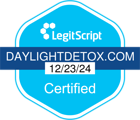Every person has different unique needs when it comes to addiction treatment. Some people need highly intensive care with around-the-clock monitoring while others simply need a support system to turn to. Most rehab centers in West Palm Beach offer several levels of care to help serve patients appropriately throughout their recovery journey.
The Importance of a Continuum of Care
Addiction is a complex disease that isn’t cured overnight. In fact, most individuals require ongoing treatment. Research shows that most people need at least 90 days of rehab for treatment to be successful, however, nearly everyone can benefit from treatment that lasts even longer than that.[1] At the same time, all treatment provided to people with substance use disorder does not have to be the same.
When patients first get sober, they must go through drug and alcohol withdrawal. For the first couple of weeks, people may feel unwell and struggle with intense drug cravings, making it difficult to stay sober. Without around-the-clock care and support, these individuals may not stay sober very long. On the other hand, patients who have been sober for two months and are showing high motivation to continue their recovery don’t need such intensive care and monitoring. They may still need bi-weekly therapy sessions to check in with their group or therapist, but they don’t require the same level of attention as they did on their first day in treatment.
The different levels of care offered in addiction treatment provide a solution to this problem. They allow patients to move down to lower levels of care as they meet certain milestones in their recovery.
Levels of Care in Addiction Treatment
Not all rehab centers in West Palm Beach offer the same levels of care. Some addiction treatment programs only offer detox and inpatient, while others offer a full continuum of care from detox to aftercare and alumni services. Be sure to speak with an admissions counselor about the types of care provided before choosing a rehab center.
Detox/Intensive Inpatient
Detox, also referred to as intensive inpatient, is the first level of care where patients spend their time in a medical facility with 24/7 care and supervision. Medications may be administered to help alleviate withdrawal symptoms and doctors, nurses, and other medical staff remain on-site all through the day and night. This is the time when patients are most vulnerable, so it is important they have intensive care and unending support.
Inpatient/Residential
Once patients are medically stable, they can transition into the inpatient or residential level of care. This is when patients live at the rehab facility, or in associated housing, that has behavioral health technicians on-site 24/7. Patients attend group and individual therapy during the day, participate in group activities in the evening, and live at the facility among their peers. Even though individuals are medically stable, they still need a lot of emotional and psychological support at this time, making inpatient the second-highest level of care recommended to people in substance abuse treatment.
Partial Hospitalization Program (PHP)
Next on the list of levels of care in addiction treatment is partial hospitalization, often referred to as PHP. PHP is similar to inpatient in the way that patients spend all of their days at the rehab facility. However, they are able to return home or to their sober living home after therapy is over for the day. This is the first step in allowing patients to regain some independence after inpatient while still receiving immense support and therapy.
Intensive Outpatient Programming (IOP)
When patients are ready to begin adjusting back to independent living, they transition from PHP to intensive outpatient (IOP). During IOP, patients attend 2-3 hours of therapy 3-5 days each week. At this point, they can begin working again or looking for a job and attending local 12-Step meetings. Then, when they go to therapy throughout the week, they report to the group about the progress they have made in their recovery.
Outpatient Program (OP)
The next step down in addiction treatment after IOP is a standard outpatient program (OP). During OP, patients meet with their therapy group 2-3 times each week for an hour or two at a time. They may also have one individual therapy session with their substance abuse counselor. These groups serve as check-ins and support as individuals prepare to embark on their recovery journey without professional treatment.
Aftercare
For many people, addiction recovery is a life-long journey that never ends. Before finishing an OP program, patients will meet with their counselor to develop an aftercare plan that will help them stay sober. Aftercare may consist of:
- Sober living
- 12-Step meetings
- Alumni groups
- SMART Recovery
- Individual counseling
Aftercare can continue as long as a person needs it to. Many people will attend 12-Step meetings and individual counseling for many years after finishing rehab.
Start Addiction Treatment in West Palm Beach Today
Here at Daylight Recovery Center, we understand that no two individuals have the same treatment needs or experience in recovery. That’s why our individually-tailored treatment programs provide custom-fit addiction services that meet your unique needs. We’ll help you from the moment you enter detox until after you are discharged from our program. Don’t wait any longer. To learn more about the levels of care offered in addiction treatment or to begin your recovery journey, call today.
References:



